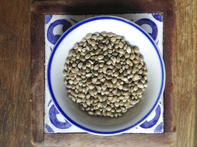The increasing demand for plant-based, high-protein foods and healthy oils has created renewed interest in the nutritional value of hemp-related food products. Hemp seeds are gluten-free and nutrient-rich with a nutty flavour and yield a high-protein flour and healthy oil.

Benefits of Hemp
Hemp seeds are high in protein (20% - 25%) and high in dietary fibre, vitamins A, B1, B6, B12, C, D and E and contains magnesium, phosphorus, potassium, calcium and iron. Edestin, an easily-digested storage protein contains all the essential amino acids and accounts for about 60 - 80% of the total protein content of hemp seeds.
The main value of hemp seeds is its oil and fatty acid composition. Hemp seeds have an oil content of 25 - 35% of which 36% is poly-unsaturated fats including omega-3, 6 and 9 fatty acids. These fatty acids reduce inflammation and help manage the symptoms of chronic diseases such as type 2 diabetes and arthritis.
Hemp’s antioxidant properties, thanks to its vitamin E and phytol content, prevent free radicals from causing cellular damage in the human body and can reduce the risk of health issues such as Parkinson’s disease, heart attacks or even Alzheimer’s disease.
Hemp in Foods
Hemp seed-derived ingredients can be used to add protein, carbohydrates, oil or nutrients to a variety of foodstuffs including shakes and juices. Hemp is also used to make plant-based derivatives as alternatives to dairy, for example, hemp milk.
After the extraction of oil from the hemp seeds, the remaining hemp cake is then grounded to form hemp flour, which contains 15 - 20 % high digestible protein. Add hemp flour as protein powder to pies, cakes, muffins and bread as a low-carb wheat flour substitute. Use 25% hemp to 75% flour ratio. Hemp flour can also be used as an ingredient in snack bars.
Hemp protein powder also can be added to smoothies and soups, while hemp flowers can be used to make a calming herbal tea. To aid the absorption of fat-soluble CBD, a bit of coconut oil, butter or full-cream milk can be added to the tea.
Hemp oil, either extracted from the seeds or the CBD-rich oil extracted from leaves and flowers are used as a dressing oil or taken as medication.
Hemp is also used to brew beer and is used as an infusion in cocktails and other beverages.
In China, roasted hemp seeds are sold as snacks by street vendors and in Russia, ‘black oil’ produced from the chlorophyll-rich mature seeds is widely used.
Hemp seeds can be hulled (then called ‘hemp hearts’) and sprinkled over salads, ground up and used in smoothies and soups or mixed with popcorn, syrup, coconut oil and chia seeds and baked in the oven to make crunchy granola.
By Marinda Louw